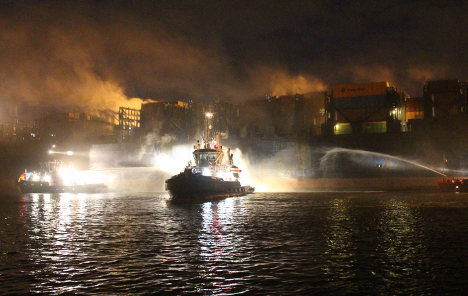Nuclear Accidents 16 - German ship with radiaoctive materials burns
On the first of May, a ship called the Atlantic Carrier was carrying radioactive materials for a uranium enrichment facility in Lingen, Germany into the harbor of Hamburg, Germany. The ship caught fire but firefighters managed remove the containers with the radioactive cargo and put out the fire before there was a major release of radioactivity.
The cargo of the container ship included nine tons of uranium hexafluoride. This chemical is highly radioactive and toxic. It is used to enrich uranium during the manufacture of nuclear fuel for reactors. There were also four tons of explosives aboard the ship. Regardless of how one feels about the transportation of nuclear fuels, it seems foolhardy in the extreme to be carrying explosives on a ship with so much nuclear material.
The public only became aware of the ship’s dangerous cargo when the Green Party of Germany sent a written demand for information to the city government. In addition to admitting that the Atlantic Carrier had radioactive cargo, the city government said that over the past three months, there had been such shipments arriving in Hamburg at the rate of about seven per month or almost two a week.
The authorities said that they would not be making the names of the ships or shipment schedules public in the future in the interest of security. This is an understandable precaution but the fact that such shipments were entering the harbor should have been known by the citizens of the city of Hamburg who were being put at risk by the shipments.
This event shines a light on the problem of shipping nuclear materials by sea. Often the containers used for such purposes have not been designed to be able to withstand collisions, fires and immersions that are the risk of ocean shipments. Of special concern are long distance shipments of nuclear fuel and nuclear waste between Western Europe and Japan. There are continuing efforts by nuclear activists to strengthen international law with respect to nuclear materials shipments. The two main international institutions that have responsibility for use of the oceans and nuclear materials are the International Maritime Organization and the International Atomic Energy Agency.
A leading expert in maritime law was commissioned to study the legal aspects of nuclear shipping. He concluded that countries along the route of a nuclear shipment are “within their rights under international law to use force to keep nuclear shipments out of their maritime zones if the shipping states refuse to notify and to consult with them in advance on routing, emergency procedures and liability arrangements.” This is would be sufficient reason for concern if the countries in question are all friends on good terms but what would happen if that were not the case? Use of force by one country against nuclear shipments by an enemy could actually precipitate a horrible nuclear accident. On a positive note, the recently announced opening of a Japanese reprocessing plant for spent nuclear fuel will reduce the need for long sea shipments of nuclear fuel and nuclear waste to and from Europe. Of course, if the Japanese dump nuclear power entirely, there wouldn’t be a need for any shipments at all.
Hamburg Harbour Fire:
